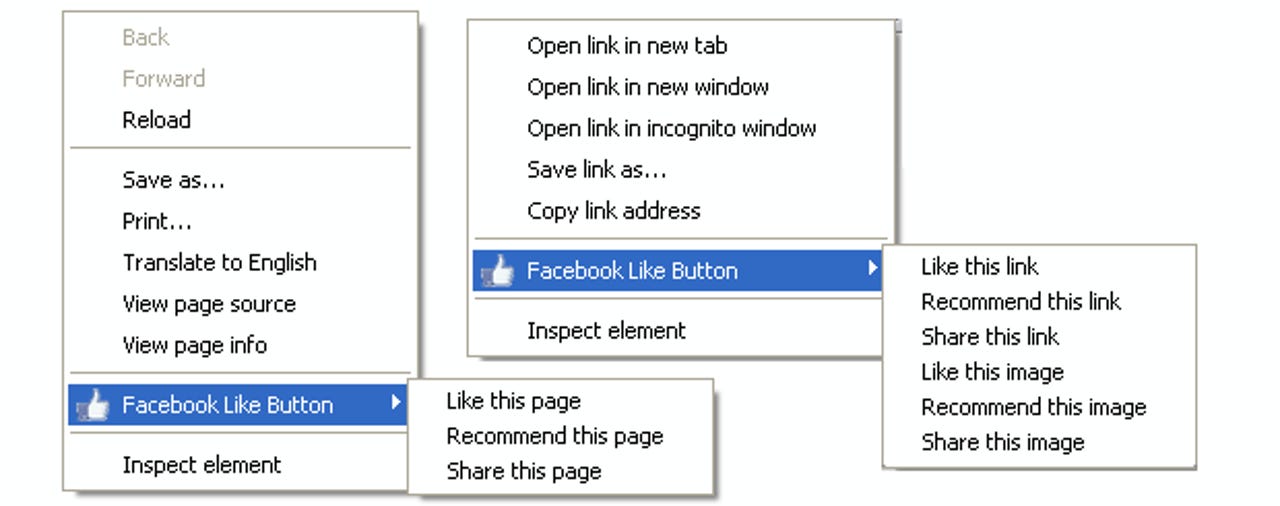Facebook quietly launches Like button for Google Chrome

Less than two months ago, Facebook quietly launched a Google Chrome extension called Facebook Like Button (via TechCrunch). The extension lets you Like, Share, or Recommend web pages, images, videos (html5 only), and audio (html5 only) on Facebook from any website by just clicking a button. That's right: even if the owner hasn't implemented a Facebook plugin on his or her website, you can still Like it with this tool.
Installing the plugin adds a thumbs-up icon to the right of the search and address box in your Chrome browser, as well as a Facebook Like Button option in the right-click menu. If you choose to share content by clicking the button, you are prompted to add a comment and can also control who can see your post before hitting Like. This means that although there are more options than for your typical Like button, you will actually have to click twice to share something.
If you right click on any webpage, the Facebook Like Button menu will also let you Like, Share, or Recommend specific content (such as images, videos, and audio). In the screenshot above, the image on the left is what you get if you right click the webpage but not any actual content and the image on the right is for an image that also links somewhere.
The reason for the HTML5 video and HTML5 audio limitation is simple. Since sharing specific content requires the use of a right-click menu, Facebook needs to be able to access it and make its own submenu. Flash doesn't let you do that, but HTML5 does.
At all times, the button displays the total number of Likes associated with any website you are viewing. Facebook shares the following information for the extension that you can read while you're deciding whether you want to install it:
By downloading and installing this plugin, you acknowledge that you have reviewed Facebook's Privacy Policy and agree to the Terms of Service , which apply to the installation and use of this plugin.
You do not need to be logged in to Facebook to install this plugin, but to like, share or recommend a page you will need to log in to a current Facebook account, or create a new one. While the plugin is installed, it will display the total number of likes for the page you are viewing. To provide a personalized experience, Facebook will see some technical information such as the URL of the page you are on, your IP address and the date and time you visited the site. All information collected before you log into Facebook is anonymous or aggregated and will not identify you.
In short, if you use this extension while you're logged into Facebook, the company will see your IP address, the URL you are at, and when you visited it. The social networking giant says it will mine this data anonymously, but to be on the safe side, make sure you really don't care whether Facebook knows what websites you visit and when.
Because Facebook did not make an announcement about this plugin, it has just 555 users according to the Chrome Web Store. It's quite clear Facebook created it though: the "Verified author: facebook.com" message on the page clearly says so.
The extension was actually launched sometime in early July, but Facebook updated it today (in the same week that Google launched its Google +1 Button for Chrome). The issue appears to be that Facebook did not make any sort of announcement for the extension.
Maybe the social networking giant is still slowly testing the Chrome extension, and simply hasn't deemed it ready yet. It's also possible the plugin was created as a side project by a single Facebook engineer or as a test by a small Facebook team.
I've asked Palo Alto for a statement. If I hear back, I'll update this post accordingly.
Update: "The Facebook Like button has been available as a Firefox extension and Greasemonkey script for awhile, and most recently as a Chrome extension," a Facebook spokesperson said in a statement. "A Facebook engineer built the extension as a side project to provide people with another way to easily Like, share and recommend pages and content with their friends from any website."
